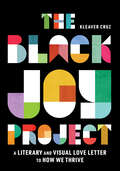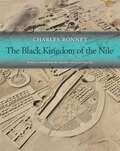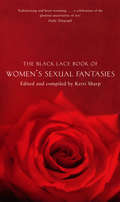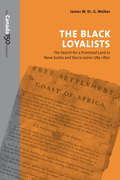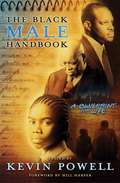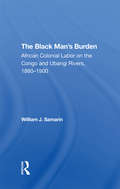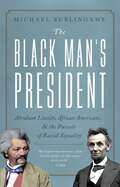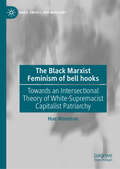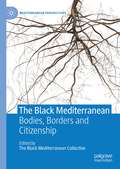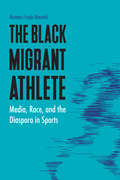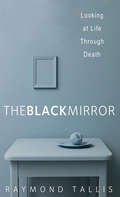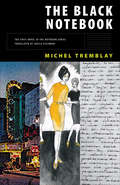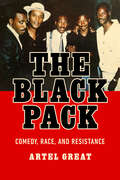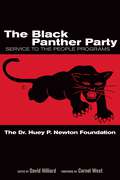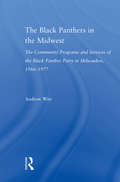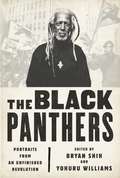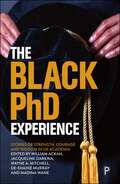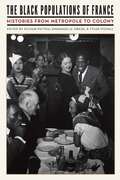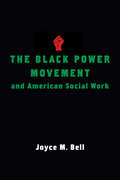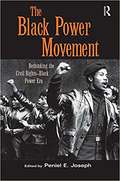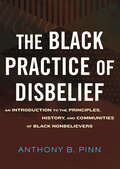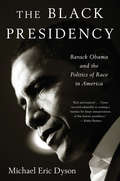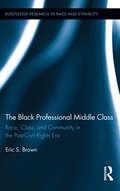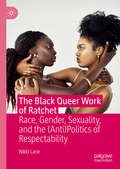- Table View
- List View
The Black Joy Project
by Kleaver CruzThe perfect holiday gift for the book lover, art enthusiast and freedom fighter in your lifeFeaturing 117 full-color photos and eight breathtaking essays on a force that fuels Black life all around the globe, this is Humans of New York meets The Black Book"A patchwork quilt of visually stunning images, captured moments of triumph, antidotes to trauma narratives and rich, ebullient emotional and verbal spice for the soul." – Michael W. Twitty, culinary and cultural historian, and author of The Cooking Gene and Koshersoul"In literature, there are some books that transcend mere pages and ink, becoming essential pieces of cultural expression. One such book poised to make its mark is The Black Joy Project…. This ambitious work breaks new ground." – EssenceBlack Joy is everywhere. From the bustling streets of Lagos to hip-hop blasting through apartment windows in the Bronx. From the wide-open coastal desert of Namibia to the lush slopes of Jamaica’s Blue Mountains. From the thriving tradition of Candomblé in Bahia to the innovative and trendsetting styles of Soweto, and beyond, Black Joy is present in every place that Black people exist. Now—at last—is a one-of-a-kind celebration of this truth and a life-giving testament to one of the most essential forces that fuels Black life: The Black Joy Project.International in the scale, fist-raising in the prose, and chockfull of gorgeous works by dozens of acclaimed artists, The Black Joy Project does what no other book has ever done. In words and art, it puts joy on the same track as protest and resistance … because that is how life is actually lived. Uprisings in the street, with music as accompaniment. Heartbreaking funerals followed by second line parades. Microaggressions in the office, then coming home to a warm hug and a garden of lilacs. The list goes on.Black Joy is always held in tension with broader systemic wounds. It is a powerful, historically important salve that allows us to keep going and reimagine new ways of being. The Black Joy Project captures these dual realities to incredible, unforgettable effect.The brainchild of educator and activist Kleaver Cruz, The Black Joy Project is an extension of a real-world initiative of the same name. It has become a source of healing and regeneration for Black people of all backgrounds and identities. Long overdue and somehow still worth the wait, The Black Joy Project is a necessary addition for any book lover, art enthusiast, or freedom fighter. And begs the question, What does Black Joy mean to you?
The Black Kingdom of the Nile
by Charles BonnetFor centuries, Egyptian civilization has been at the origin of the story we tell about the West. But Charles Bonnet’s archaeological excavations have unearthed extraordinary sites in modern Sudan that challenge this notion and compel us to look to black Africa and the Nubian Kingdom of Kush, where a highly civilized state existed 2500–1500 BCE.
The Black Lace Book of Women's Sexual Fantasies (Black Lace Book Of Women Sexual Fantasies #3)
by Kerri SharpThe Black Lace Book of Women's Sexual Fantasies reveals the most private thoughts of hundreds of women. Here are sexual fantasies which on first sight appear shocking or bizarre - such as the bank clerk who wants to be a vampire and the nanny with a passion for Darth Vader.Kerri Sharp investigates the recurrent themes in female fantasies and the cultural influences that have determined them: from fairy stories to cult TV; from fetish fashion to historical novels.
The Black Loyalists: The Search for a Promised Land in Nova Scotia and Sierra Leone, 1783-1870
by James W. WalkerThere is a Canadian myth about the Loyalists who left the United States after the American Revolution for Canada. The myth says they were white, upper-class citizens devoted to British ideals, transplanting the best of colonial American society to British North America. In reality, more than 10 per cent of the Loyalists who came to the Maritime provinces were black and had been slaves. The Black Loyalists tells the story of one such group who came to Nova Scotia, but didn't stay. James Walker documents their experience in Canada, following them across the Atlantic as they became part of a unique colonial experiment in Sierra Leone.
The Black Male Handbook: A Blueprint for Life
by Kevin PowellAuthor and activist Kevin Powell and contributors Lasana Omar Hotep, Jeff Johnson, Byron Hurt, Dr. William Jelani Cobb, Ryan Mack, Kendrick B. Nathaniel, and Dr. Andre L. Brown deliver an essential collection of essays for Black men at all stages of their lives on surviving and thriving in an unjust world.The Black Male Handbook answers a collective hunger for new direction, fresh solutions to old problems, and a different kind of conversation—man-to-man and with Black male voices, all from the hip hop generation. The book tackles issues related to political, practical, cultural, and spiritual matters, and ending violence against women and girls. The book also features an appendix filled with useful readings, advice, and resources. The Black Male Handbook is a blueprint for those aspiring to thrive against the odds in America today. This is a must-have book, not only for Black male readers, but the women who befriend, parent, partner, and love them.
The Black Man's Burden: African Colonial Labor On The Congo And Ubangi Rivers, 1880-1900
by William J. SamarinThis book is an enquiry into early European colonial expansion in Central Africa especially in upper Zaire (Congo) and Ubangi rivers. It explores the extent to which French and Belgian colonial enterprise were dependent on the African labor and their penetration into Zaire basin.
The Black Man's President: Abraham Lincoln, African Americans, and the Pursuit of Racial Equality
by Michael BurlingameFrederick Douglass called the martyred president "emphatically the black man's president&” as well as &“the first who rose above the prejudice of his times and country.&” This narrative history of Lincoln&’s personal interchange with Black people over the course his career reveals a side of the sixteenth president that, until now, has not been fully explored or understood.In a little-noted eulogy delivered shortly after Lincoln's assassination, Frederick Douglass called the martyred president "emphatically the black man's president," the "first to show any respect for their rights as men.&” To justify that description, Douglass pointed not just to Lincoln's official acts and utterances, like the Emancipation Proclamation or the Second Inaugural Address, but also to the president&’s own personal experiences with Black people. Referring to one of his White House visits, Douglass said: "In daring to invite a Negro to an audience at the White House, Mr. Lincoln was saying to the country: I am President of the black people as well as the white, and I mean to respect their rights and feelings as men and as citizens.&” But Lincoln&’s description as &“emphatically the black man&’s president&” rests on more than his relationship with Douglass or on his official words and deeds. Lincoln interacted with many other African Americans during his presidency His unfailing cordiality to them, his willingness to meet with them in the White House, to honor their requests, to invite them to consult on public policy, to treat them with respect whether they were kitchen servants or leaders of the Black community, to invite them to attend receptions, to sing and pray with them in their neighborhoods—all those manifestations of an egalitarian spirit fully justified the tributes paid to him by Frederick Douglass and other African Americans like Sojourner Truth, who said: "I never was treated by any one with more kindness and cordiality than were shown to me by that great and good man, Abraham Lincoln.&” Historian David S. Reynolds observed recently that only by examining Lincoln&’s &“personal interchange with Black people do we see the complete falsity of the charges of innate racism that some have leveled against him over the years.&”
The Black Marxist Feminism of bell hooks: Towards an Intersectional Theory of White-Supremacist Capitalist Patriarchy (Marx, Engels, and Marxisms)
by Hue WoodsonThis book explores bell hooks' trajectory of work and cohesiveness of thought about the meaning and meaningfulness of black womanhood in terms of a Black Marxist feminism, which uniquely confronts the dimensions of feminism and womanism; the relations between the secular and the religious; the problems of gender and sexism; and the structural and systemic issues of oppression, domination, white supremacy, and capitalism. In making sense of black womanhood in its philosophical, social, cultural, institutional, and historical complexities, hooks' Black Marxist feminism constructs an intersectional theory about what hooks describes as white supremacist capitalist patriarchy. In this sense, hooks' Black Marxist feminism conceptualizes the ways and means by which white supremacist capitalist patriarchy imposes intersectional predicaments upon black womanhood, drawing foundationally on Karl Marx and Fredrich Engels, working within the purview of a host of Marxisms in Antonio Gramsci, Louis Althusser, Karl Kautsky, Nikolai Bukharin, and Georgi Plekhanov, and speaking to the Marxist proclivities of Cedric Robinson, Cornel West, Charles W. Mills, James H. Cone, Stuart Hall, and Angela Y. Davis.
The Black Mediterranean: Bodies, Borders and Citizenship (Mediterranean Perspectives)
by Timothy Raeymaekers Gabriele Proglio Camilla Hawthorne Ida Danewid P. Khalil Saucier Giuseppe Grimaldi Angelica Pesarini Giulia Grechi Vivian GerrandThis edited volume aims to problematise and rethink the contemporary European migrant crisis in the Central Mediterranean through the lens of the Black Mediterranean. Bringing together scholars working in geography, political theory, sociology, and cultural studies, this volume takes the Black Mediterranean as a starting point for asking and answering a set of crucial questions about the racialized production of borders, bodies, and citizenship in contemporary Europe: what is the role of borders in controlling migrant flows from North Africa and the Middle East?; what is the place for black bodies in the Central Mediterranean context?; what is the relevance of the citizenship in reconsidering black subjectivities in Europe? The volume will be divided into three parts. After the introduction, which will provide an overview of the theoretical framework and the individual contributions, Part I focuses on the problem of borders, Part II features essays focused on the body, and Part III is dedicated to citizenship.
The Black Migrant Athlete: Media, Race, and the Diaspora in Sports (Sports, Media, and Society)
by Munene Franjo MwanikiThe popularity and globalization of sport have led to an ever-increasing migration of black athletes from the global South to the United States and Western Europe. While the hegemonic ideology surrounding sport is that it brings diverse people together and ameliorates social divisions, sociologists of sport have shown this to be a gross simplification. Instead, sport and its narratives often reinforce and re-create stereotypes and social boundaries, especially regarding race and the prowess and the position of the black athlete. Because sport is a contested terrain for maintaining and challenging racial norms and boundaries, the black athlete has always impacted popular (white) perceptions of blackness in a global manner.The Black Migrant Athlete analyzes the construction of race in Western societies through a study of the black African migrant athlete. Munene Franjo Mwaniki presents ten black African migrant athletes as a conceptual starting point to interrogate the nuances of white supremacy and of the migrant and immigrant experience with a global perspective. By using celebrity athletes such as Hakeem Olajuwon, Dikembe Mutombo, and Catherine Ndereba as entry points into a global discourse, Mwaniki explores how these athletes are wrapped in social and cultural meanings by predominately white-owned and -dominated media organizations. Drawing from discourse analysis and cultural studies, Mwaniki examines the various power relations via media texts regarding race, gender, sexuality, class, and nationality.
The Black Mirror
by Raymond TallisIn this beautifully written personal meditation on life and living, Raymond Tallis reflects on the fundamental fact of existence: that it is finite. Inspired by E. M. Forster's thought that "Death destroys a man but the idea of it saves him," Tallis invites readers to look back on their lives from a unique standpoint: one's own future corpse. From this perspective, he shows, the world now vacated can be seen most clearly in all its richness and complexity. Tallis blends lyrical reflection, humor, and the occasional philosophical argument as he explores his own postmortem recollections. He considers the biological processes and the senses that opened up his late world and the million-nooked space in which he passed his life. His inert, dispossessed body highlights his ceaseless activity in life, the mind-boggling inventory of his possessions, and the togetherness and apartness that characterized his relationships in the material and social worlds. Tallis also touches on the idea of a posthumous life in the memories of those who outlive him. Readers who accompany Tallis as he considers his life through death will appreciate with new intensity the precariousness and preciousness of life, for here he succeeds in his endeavor to make "the shining hour" shine more brightly.
The Black Notebook
by Michel Tremblay Sheila FischmanIn the heart of the Latin Quarter, meeting place of marginal characters of all sorts, Céline Poulin works the night shift at a cheap and popular restaurant, Le Sélect, serving hamburger platters and spaghetti and meatballs to student misfits, transvestites, hookers and queens from the Main-Montreal's disreputable Boulevard Saint-Laurent. Hanging out with a theatre company in her off hours, Céline sees opening before her a world where it is not only possible, but even desirable to pretend. When the director offers her a role in The Trojan Women, the die is cast.The Black Notebook is Céline's diary, her account of her trials and tribulations, her expectations and her cruel disappointments, because this young waitress at Le Sélect has her own dramatic story to tell, even if only to herself: Céline is a midget.From the theatre of Euripides to the theatre of Montreal's Main, Michel Tremblay-our Balzac-creates and gives voice to some astonishing new characters in this first of a new series of novels. For the characters of The Black Notebook, the first in this trilogy, life is a comedy that barely conceals the cruel and pitiless tragedy of the everyday. With a transcendent eloquence and compassion, Michel Tremblay celebrates how it is possible for Céline to embrace her difference and to flourish-despite that difference, or perhaps, because of it.
The Black Pack: Comedy, Race, and Resistance
by Artel GreatThe Black Pack: Comedy, Race & Resistance is the first book to chronicle the untold history behind the iconic collaborations between a legendary group of comedians—Eddie Murphy, Paul Mooney, Keenen Ivory Wayans, Robert Townsend, and Arsenio Hall—who joined forces as the “Black Pack” in the late 1980s to create a series of socially-charged comedies that revolutionized popular culture and transformed American comedy. Working together as writers, directors, producers, actors, and consultants, the Black Pack created some of the most provocative and enduring Black films and television shows of the twentieth century, including classic productions like In Living Color, Coming to America, Hollywood Shuffle, and The Arsenio Hall Show. The Black Pack collective was armed with a signature comedic style which combined politically-Black satire with edgy social humor that entertained millions, shattered box-office records, and slyly critiqued America’s racial condition. Amid escalating social tensions in the 1980s, the Black Pack’s comedic output transformed anger into art, wielding the cloak of humor as a rebellious tool to confront unjust business practices in Hollywood and challenge racial narratives embedded in American culture. Their work empowered unapologetically Black voices and expanded creative possibilities for Black artists in the entertainment industry. In The Black Pack, Artel Great delivers the most comprehensive analysis of this groundbreaking comedy collective, uncovering how the group’s socially and politically-charged humor defied systemic barriers to achieve unprecedented commercial success and establish a cultural legacy that continues to inspire media creators today and across new generations.
The Black Panther Party: Service to the People Programs
by David HilliardThe Black Panther Party represents Black Panther Party members' coordinated responses over the last four decades to the failure of city, state, and federal bureaucrats to address the basic needs of their respective communities. The Party pioneered free social service programs that are now in the mainstream of American life. The Party's Sickle Cell Anemia Research Foundation, operated with Oakland's Children's Hospital, was among the nation's first such testing programs. Its Free Breakfast Program served as a model for national programs. Other initiatives included free clinics, grocery giveaways, school and education programs, senior programs, and legal aid programs. Published here for the first time in book form, The Black Panther Party makes the case that the programs' methods are viable models for addressing the persistent, basic social injustices and economic problems of today's American cities and suburbs.
The Black Panthers in the Midwest: The Community Programs and Services of the Black Panther Party in Milwaukee, 1966–1977 (Studies in African American History and Culture)
by Andrew WittThis book analyzes the community programs of the Black Panther Party, specifically those of the Milwaukee branch, with the aim of dispelling many of the existing stereotypes about the Party. Misconceptions range from the Party being labeled as bent on the violent destruction of the United States to it being an overwhelmingly sexist group. This book challenges stereotypes such as these by examining the community programs of the Party and by looking at the role of women in the Party. Witt argues that the Party was not an extremist group dedicated to overthrowing the government of the United States, but rather an organization committed to providing essential community services for lower-income and working-class African American communities around the nation.
The Black Panthers: Portraits from an Unfinished Revolution (E-duke Books Scholarly Collection)
by Peniel E. Joseph Yohuru Williams Bryan Shih"Brilliant, painful, enlightening, tearful, tragic, sad, and funny, this photo-essay book is at its core about healing, and about the social justice work that still needs to be done in the era of hip-hop, Black Lives Matter, and the historic presidency of Barack Obama.” -Kevin Powell, author of The Education of Kevin Powell: A Boy's Journey into Manhood"A brilliantly conceived volume. Bryan Shih and Yohuru Williams demonstrate why the Panthers' story-its lessons and failures-even fifty years after its founding remains key to understanding national and international struggles for freedom and justice today.” -Cheryl Finley, professor and director of visual studies, Cornell UniversityEven fifty years after it was founded, the Black Panther Party remains one of the most misunderstood political organizations of the twentieth century. But beyond the labels of "extremist” and "violent” that have marked the party, and beyond charismatic leaders like Huey Newton, Bobby Seale, and Eldridge Cleaver, were the ordinary men and women who made up the Panther rank and file.In The Black Panthers, photojournalist Bryan Shih and historian Yohuru Williams offer a reappraisal of the party's history and legacy. Through stunning portraits and interviews with surviving Panthers, as well as illuminating essays by leading scholars, The Black Panthers reveals party members' grit and battle scars-and the undying love for the people that kept them going.
The Black PhD Experience: Stories of Strength, Courage and Wisdom in UK Academia
by William Ackah, Jacqueline Darkwa, Wayne A. Mitchell, De-Shaine Murray and Madina WaneThis unique book charts the journeys of Black doctoral students through UK higher education. Using powerful firsthand accounts, the book details the experiences of Black PhD students. From application through to graduation and beyond, the book offers key insights into the workings of higher education, highlighting the structural barriers that impede progress. Challenges and recommendations are issued for the sector and wider community. This text is a witness to the tenacity and brilliance of Black students to achieve against the odds. A game changer for the sector. Essential reading for anyone interested in equity and inclusion in higher education.
The Black Populations of France: Histories from Metropole to Colony
by Tyler Stovall Sylvain Pattieu Emmanuelle SibeudThe Black Populations of France is a study of Black peoples and their history in France and the French Empire during the modern era, from the eighteenth century to the present. The contributors to this collection explore three main axes. The first addresses circulations—the ways Black populations have moved through the spaces of metropolitan France and the empire—and focuses on the actors themselves and the margins of maneuver available to them, particularly as soldiers, sailors, immigrants, or political militants. The second considers legacies and the ways the past has informed the present, addressing themes such as the memory of slavery, the histories of Black women and gender, and the historical influence of African Americans on Blacks in France. The final axis considers racial policy and the ways the state has shaped racial discourses through the interactions between state policies and ideas of race developed by individuals, organizations, and communities. The Black Populations of France makes an important contribution to both modern French history and the history of the global Black diaspora. By putting these histories in dialogue with each other, it underscores the central place of France in world history.
The Black Power Movement and American Social Work
by Joyce BellThe Black Power movement has often been portrayed in history and popular culture as the quintessential "bad boy" of modern black movement-making in America. Yet this impression misses the full extent of Black Power's contributions to U.S. society, especially in regard to black professionals in social work. Relying on extensive archival research and oral history interviews, Joyce M. Bell follows two groups of black social workers in the 1960s and 1970s as they mobilized Black Power ideas, strategies, and tactics to change their national professional associations. Comparing black dissenters within the National Federation of Settlements (NFS), who fought for concessions from within their organization, and those within the National Conference on Social Welfare (NCSW), who ultimately adopted a separatist strategy, she shows how the Black Power influence was central to the creation and rise of black professional associations. She also provides a nuanced approach to studying race-based movements and offers a framework for understanding the role of social movements in shaping the non-state organizations of civil society.
The Black Power Movement and American Social Work
by Joyce M. BellThe Black Power movement has often been portrayed in history and popular culture as the quintessential "bad boy" of modern black movement making in America. Yet this image misses the full extent of Black Power's contributions to U.S. society, especially in regard to black professionals in social work.Relying on extensive archival research and oral history interviews, this study follows two groups of black social workers in the 1960s and 1970s as they mobilized Black Power ideas, strategies, and tactics to change their national professional associations. Comparing black dissenters within the National Federation of Settlements (NFS), who fought for concessions from within their organization, and those within the National Conference on Social Work (NCSW), who ultimately adopted a separatist strategy, this book shows how the Black Power influence was central to the rise of black professional associations. It provides a nuanced approach to studying race-based movements and offers a framework for understanding the role of social movements in shaping the nonstate organizations of civil society.
The Black Power Movement: Rethinking the Civil Rights-Black Power Era
by Peniel E. JosephThe Black Power Movement remains an enigma. Often misunderstood and ill-defined, this radical movement is now beginning to receive sustained and serious scholarly attention. Peniel Joseph has collected the freshest and most impressive list of contributors around to write original essays on the Black Power Movement. Taken together they provide a critical and much needed historical overview of the Black Power era. Offering important examples of undocumented histories of black liberation, this volume offers both powerful and poignant examples of 'Black Power Studies' scholarship.
The Black Practice of Disbelief: An Introduction to the Principles, History, and Communities of Black Nonbelievers
by Anthony PinnA short introduction to Black Humanism: its history, its present, and the rich cultural sensibilities that infuse itIn the United States, to be a Black American is to be a Black Christian. And there&’s something to this assumption in that the vast majority of African Americans are Christian. However, in recent years a growing number of African Americans have said they claim no particular religious affiliation—they are Black "nones." And of these Black "nones," the most public and vocal are those who claim to be humanists.What does it mean to be a Black humanist? What do Black humanist believe, and what do they do? This slim volume answers these questions. Animated by six central principles, and discussed in terms of its history, practices, formations, and community rituals, this book argues that Black humanism can be understood as a religious movement. Pinn makes a distinction between theism and religion—which is simply a tool for examining, naming, and finding the meaning in human experience. Black humanism, based on this definition isn&’t theistic but it is a religious system used to explore human experience and foster life meaning. It infuses humanism with rich cultural sensibilities drawn from Black experience. As shown in these pages, thinking about Black humanism this way frees readers from making unfounded assumptions and enables them to better appreciate the secular &“beliefs,&” ritual structures, and community formation constituted by Black humanists.
The Black Presidency: Barack Obama and the Politics of Race in America
by Michael Eric DysonA provocative and lively examination of the meaning of America's first black presidency, by the New York Times-bestselling author of Tears We Cannot Stop. Michael Eric Dyson explores the powerful, surprising way the politics of race have shaped Barack Obama&’s identity and groundbreaking presidency. How has President Obama dealt publicly with race—as the national traumas of Tamir Rice, Trayvon Martin, Michael Brown, Eric Garner, Freddie Gray, and Walter Scott have played out during his tenure? What can we learn from Obama's major race speeches about his approach to racial conflict and the black criticism it provokes? Dyson explores whether Obama&’s use of his own biracialism as a radiant symbol has been driven by the president&’s desire to avoid a painful moral reckoning on race. And he sheds light on identity issues within the black power structure, telling the fascinating story of how Obama has spurned traditional black power brokers, significantly reducing their leverage. President Obama&’s own voice—from an Oval Office interview granted to Dyson for this book—along with those of Eric Holder, Al Sharpton, Jesse Jackson, Andrew Young, and Maxine Waters, among others, add unique depth to this profound tour of the nation&’s first black presidency. &“Dyson proves…that he is without peer when it comes to contextualizing race in twenty-first-century America… A must-read for anyone who wants to better understand America&’s racial past, present, and future.&”—Gilbert King, author of the Pulitzer Prize–winning Devil in the Grove&“No one understands the American dilemma of race—and Barack Obama&’s confounding and yet wondrous grappling with it—better than [Dyson.]&”—Douglas Blackmon, author of the Pulitzer Prize–winning Slavery by Another Name
The Black Professional Middle Class: Race, Class, and Community in the Post-Civil Rights Era (Routledge Research in Race and Ethnicity #8)
by Eric S. BrownThrough an in-depth case study of the black professional middle class in Oakland, this book provides an analysis of the experiences of black professionals in the workplace, community, and local politics. Brown shows how overlapping dynamics of class formation and racial formation have produced historically powerful processes of what he terms "racialized class formation," resulting in a distinct (and internally differentiated) entity, not merely a subset of a larger professional middle class.
The Black Queer Work of Ratchet: Race, Gender, Sexuality, and the (Anti)Politics of Respectability
by Nikki LaneThis book enters as a corrective to the tendency to trivialize and (mis)appropriate African American language practices. The word ratchet has entered into a wider (whiter) American discourse the same way that many words in African American English have—through hip-hop and social media. Generally, ratchet refers to behaviors and cultural expressions of Black people that sit outside of normative, middle-class respectable codes of conduct. Ratchet can function both as a tool for critiquing bad Black behavior, and as a tool for resisting the notion that there are such things as “good” and “bad” behavior in the first place. This book takes seriously the way ratchet operates in the everyday lives of middle-class and upwardly mobile Black Queer women in Washington, DC who, because of their sexuality, are situated outside of the norms of (Black) respectability. The book introduces the concept of “ratchet/boojie cultural politics” which draws from a rich body of Black intellectual traditions which interrogate the debates concerning what is and is not “acceptable” Black (middle-class) behavior. Placing issues of non-normative sexuality at the center of the conversation about notions of propriety within normative modes of Black middle-class behavior, this book discusses what it means for Black Queer women’s bodies to be present within ratchet/boojie cultural projects, asking what Black Queer women’s increasing visibility does for the everyday experiences of Black queer people more broadly.
